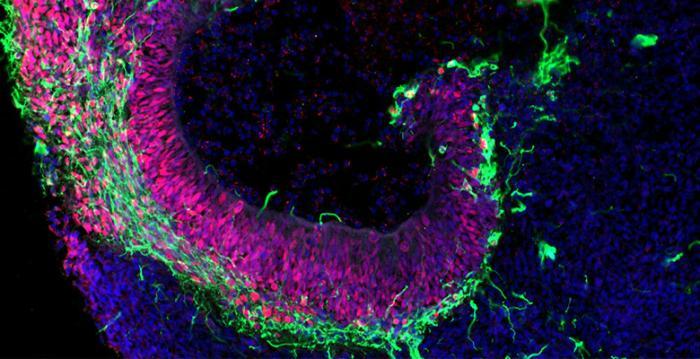As well as the article, published in the journal Nature, they also published the LifeTime Strategic Research Agenda, a white paper that explains their suggested approach to turn to molecular and cellular biology for personalised medical treatments in the future.
The LifeTime Initiative, which includes EMBL Heidelberg and EMBL’s European Bioinformatics Institute (EMBL-EBI), has developed a strategy to integrate breakthrough technologies to further develop personalised treatments for five major classes of disease: cancer, cardiovascular and metabolic disorders, chronic inflammation, infectious diseases, and neurological disorders. LifeTime is a consortium of more than 90 leading European research institutions, together with international advisers and over 80 supporting companies.
Both publications elaborate on a roadmap for implementing cell-based medicine in Europe within the next decade. The roadmap explains how technology can be rapidly co-developed and transitioned into clinical settings to address key medical challenges. This requires close interactions between research institutions, hospitals, industry, and European infrastructures to deploy and analyse medical big data across European borders. LifeTime’s vision advocates ethically responsible research that benefits all citizens, as outlined in an EMBO Journalc ommentary.
“The experimental techniques and technology platforms described in this Agenda have the potential to positively impact human health,” says John Marioni, an EMBL-EBI Research Group Leader. “However, to reach its full potential and ensure that cutting-edge machine learning is rapidly deployed to discover patterns associated with health status, the scientific community must share data. It’s vital.”
Helen Parkinson, EMBL-EBI Team Leader for Samples, Phenotypes and Ontologies and Head of Molecular Archives, adds, “Over the past 25 years, EMBL-EBI has not only developed computational methods that have enabled the uptake of these new technologies, but has also played a key role in ensuring that biological data can be quickly and easily shared and reused. We’re excited to contribute our expertise in the context of LifeTime, ensuring the data generated is analysed using cutting-edge methods, and that these data can be securely and rapidly shared across Europe, according to the FAIR principles.”
The European Commission has established FAIR Data Principles as a set of uniform guiding principles to make data findable, accessible, interoperable, and reusable.
Navigating this roadmap to precision healthcare
The Agenda starts with the premise that human cells are programmed to follow certain developmental paths during which they acquire specific functions. When they deviate from their healthy course, the changes lead to disease.
Scientists – and ultimately health care providers – can now understand molecular details and changes responsible for driving the onset and progression of diseases or the emergence of therapy resistance in each patient, LifeTime reports. Single-cell and imaging technologies allow scientists to observe and analyse cells individually and understand how cells ‘make decisions’.
“We have brought together scientists, clinicians, computational scientists, engineers, mathematicians, physicists, social scientists, and more to understand mechanisms and find new means for intervention,” says Nikolaus Rajewsky, Scientific Director of the Berlin Institute for Medical System Biology at the Max Delbrück Center for Molecular Medicine, and LifeTime Initiative coordinator. “Cell-based medicine will diagnose diseases much earlier and intercept disorders before irreparable damage has occurred, allowing us to cure patients instead of treating their symptoms. LifeTime has a unique value proposition that promises to improve the European patient’s health and the transformation of healthcare.”
Artificial intelligence and machine learning will identify complex patterns that can be reliably learned, and their output can be made interpretable for humans. This will be crucial for creating personalised disease models (organoids) for a patient that will guide the design of personalised therapeutic strategies and, at the same time, replace the need for animal models. This will substantially improve the outlook for many patients through timely treatment and more effective therapies, and has the potential to save billions of euros in disease-related costs in Europe, LifeTime reports.
"By applying interceptive, cell-based medicine we will be able to considerably raise cure rates across many diseases. In the case of cancer, we can expect them to go up to 75% globally,” says Geneviève Almouzni, co-coordinator of the LifeTime Initiative from Institut Curie in Paris. “It would save 6 billion euros in productivity gains across all cancer cases. Patients all over the world will be able to lead longer, healthier lives. The economic impact would be tremendous. For COVID-19, for instance, we could envisage significantly shortened ICU stays, which would help to lower costs. We have to invest in the necessary research now.”
Source articles
RAJEWSKY et al. (2020). LifeTime and improving European healthcare through cell-based interceptive medicine. Nature. Published 07 09; DOI: 10.1038/s41586-020-2715-9
Read more about the LifeTime Initiative
Image: Personalised medicine will advance due to important advances like the increasing use of organoids. Here, sections of cerebral brain organoids have been derived from pluripotent stem cells. Credit: ©Agnieszka Rybak-Wolf, MDC/LifeTime
